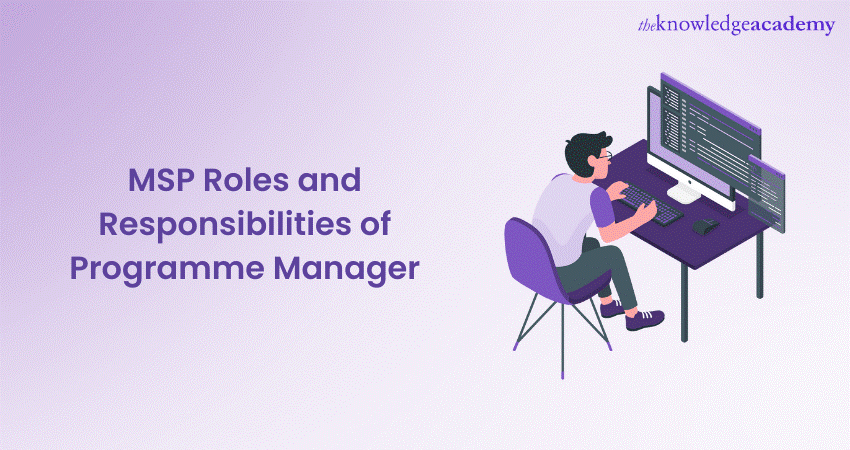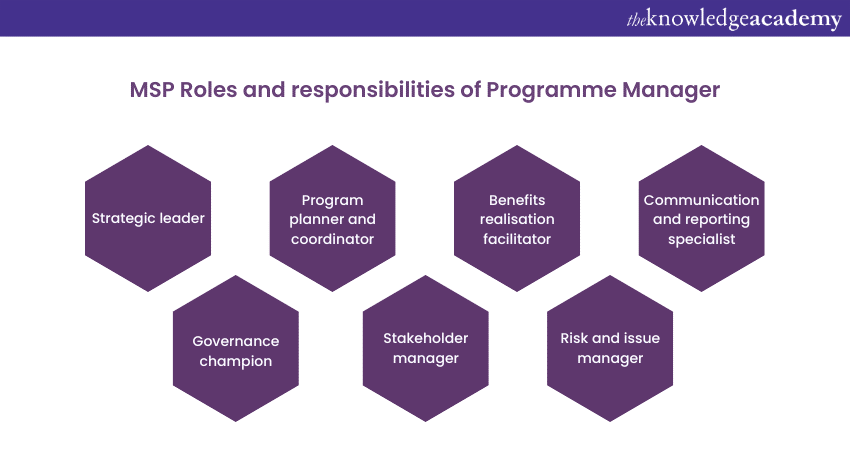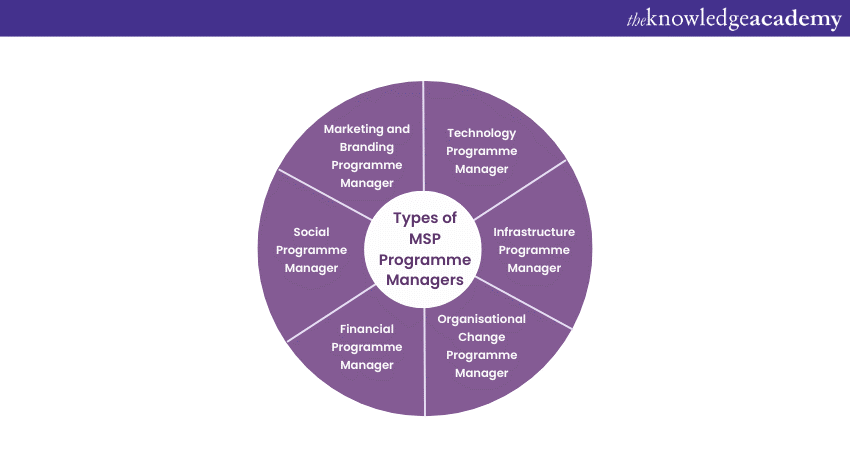We may not have the course you’re looking for. If you enquire or give us a call on +41 315281584 and speak to our training experts, we may still be able to help with your training requirements.
Training Outcomes Within Your Budget!
We ensure quality, budget-alignment, and timely delivery by our expert instructors.

In today's fast-paced and dynamic business environment, organisations face increasing challenges in managing complex programmes that span multiple projects and stakeholders. This is where the Programme Manager brings their experience, knowledge, and strategic vision. As an integral role within the Managing Successful Programmes (MSP) framework, the MSP Roles of a Programme Manager include orchestrating the execution of strategic initiatives and delivering the desired outcomes.
The success of any programme in an organisation relies heavily on the expertise and leadership of a skilled Programme Manager. An effective Programme Manager possesses excellent communication and interpersonal skills, allowing them to collaborate with diverse stakeholders, including senior executives, project managers, team members, and external partners.
In this blog, you will learn about the MSP Roles of a Programme Manager, their responsibilities, and more.
Table of Contents
1) Who is an MSP Programme Manager?
2) Roles and responsibilities of an MSP Programme Manager
a) Strategic leader
b) Governance champion
c) Program planner and coordinator
d) Stakeholder manager
e) Benefits realisation facilitator
f) Risk and issue manager
g) Communication and reporting specialist
3) Types of Programme Managers in MSP
4) Conclusion
Who is an MSP Programme Manager?
An MSP Programme Manager is an experienced professional responsible for overseeing and managing the successful delivery of complex programmes within the MSP framework. They possess a unique combination of leadership, strategic thinking, and project management skills.
With a deep understanding of the organisation's objectives and strategic goals, the Programme Manager ensures that the programme aligns with these priorities and contributes to the business's overall success with the help of MSP Principles.
They are visionaries who translate strategic objectives into actionable plans, sets a clear direction, and inspires others to work towards a common goal. Additionally, they are experts in governance and MSP risk management. They establish governance structures, ensuring that decision-making processes are in place and compliant with regulations.
They proactively identify and address risks, mitigating potential obstacles that could hinder the programme's progress. The Programme Manager also excels in stakeholder management, actively engaging with diverse stakeholders and fostering open communication to maintain alignment and support throughout the programme lifecycle.
The MSP Programme Manager leverages the MSP Blueprint, a crucial component of the MSP framework, to guide the programme's direction and execution. The Blueprint provides a detailed outline of the programme's vision, design, and outcomes, ensuring a clear and consistent understanding among all stakeholders.
Ready to enhance your skills as an MSP Programme Manager? Sign up for our MSP® Training Courses today!
Roles and responsibilities of an MSP Programme Manager
Within the Managing Successful Programmes (MSP) framework, the Programme Manager assumes various key roles essential for successfully delivering strategic programmes. Let's explore these roles and their corresponding responsibilities in detail:

1) Strategic leader
The Programme Manager plays a crucial role in defining and articulating the programme's strategic vision. They align the programme's objectives with the organisation's strategic goals, ensuring that it contributes to the overall business strategy.
By understanding the strategic context, the Programme Manager provides clarity and direction to the programme team and stakeholders, enabling them to work towards a common goal. Their responsibilities include:
a) Defining the programme's strategic vision and objectives
b) Aligning the programme with the organisational strategy
c) Establishing a strategic roadmap for achieving programme goals
2) Governance champion
Establishing effective governance structures is vital for programme success, and the Programme Manager is responsible for implementing robust governance arrangements. They create the Programme Board, comprising senior executives and key stakeholders, to oversee decision-making, monitor progress, and resolve issues.
The Programme Manager ensures the programme operates within defined frameworks and adheres to established governance processes. They provide regular updates and reports to the Programme Board, informing them about the programme's performance and seeking necessary approvals. Thus, their responsibilities include:
a) Establishing governance arrangements and structures
b) Overseeing decision-making processes
c) Ensuring compliance with regulatory requirements
3) Program planner and coordinator
Programme planning and coordination are vital responsibilities of the Programme Manager. They develop a comprehensive programme plan that encompasses key activities, milestones, dependencies, and resource requirements. The Programme Manager coordinates with project managers and stakeholders to ensure alignment, integration, and efficient delivery of programme components. Their responsibilities include:
a) Developing a detailed programme plan
b) Coordinating activities and resources across projects
c) Monitoring progress and ensuring adherence to the plan
4) Stakeholder manager
Engaging and managing stakeholders is critical to a Programme Manager's role. They identify key stakeholders, assess their interests, and develop strategies for effective engagement. The Programme Manager establishes strong relationships, communicates regularly, and ensures that stakeholder expectations are understood and incorporated into the programme's activities. Their responsibilities are as follows:
a) Identifying and analysing stakeholders
b) Developing stakeholder engagement strategies
c) Facilitating communication and collaboration with stakeholders
5) Benefits realisation facilitator
Programme Managers are responsible for ensuring the realisation of programme benefits. They work closely with stakeholders to define measurable benefits, develop strategies for their achievement, and establish mechanisms to track progress.
The Programme Manager monitors benefit realisation, takes corrective actions when necessary, and ensures that the programme remains focused on delivering the expected outcomes. Their responsibilities include the following:
a) Defining measurable benefits and outcomes
b) Developing benefit realisation strategies
c) Monitoring progress and adjusting strategies as needed
6) Risk and issue manager
Managing risks and issues is a crucial responsibility of the Programme Manager. They identify potential risks, assess their impact, and develop mitigation strategies. The Programme Manager establishes processes for risk identification, monitoring, and response. They proactively manage issues, facilitating their resolution and minimising their impact on the programme's progress. Their responsibilities include the following:
a) Identifying and assessing risks
b) Developing risk mitigation and contingency plans
c) Facilitating issue resolution and escalation
7) Communication and reporting specialist
Effective communication and reporting are essential for programme success, and the Programme Manager acts as the central point of communication. They ensure that information flows seamlessly among stakeholders, providing regular updates on the programme's progress, achievements, challenges, and upcoming milestones. The Programme Manager facilitates effective communication channels, fosters collaboration, and encourages transparency. Their responsibilities include:
a) Facilitating effective communication among stakeholders
b) Preparing regular progress reports and updates
c) Promoting transparency and collaboration within the programme
Acquire the skills to excel as an MSP Programme Manager with our MSP® Foundation & Practitioner Course now!
Types of Programme Managers
While the core responsibilities of Programme Managers remain consistent across different programmes, their specific focus and expertise may vary depending on the nature of the programme. Let's explore some of the different types of Programme Managers based on their areas of specialisation:

1) Technology Programme Manager
Technology Programme Managers possess in-depth knowledge and expertise in managing complex technology-focused programmes. They are well-versed in handling projects related to software development, infrastructure upgrades, system implementations, and digital transformations.
These Programme Managers understand the technical aspects of the programme, coordinate with Information Technology (IT) teams and vendors, and ensure the seamless integration of technology solutions to achieve programme objectives.
2) Infrastructure Programme Manager
Infrastructure Programme Managers are skilled in managing large-scale infrastructure development programmes. They are experienced in overseeing projects related to construction, transportation, utilities, and other physical infrastructure projects.
These Programme Managers have a strong understanding of engineering principles, project scheduling, resource allocation, and risk management specific to infrastructure projects. They collaborate with various stakeholders, including architects, engineers, contractors, and government agencies, to deliver the infrastructure programme successfully.
3) Organisational Change Programme Manager
Organisational Change Programme Managers specialise in driving transformational change within an organisation. They focus on managing programmes that involve significant changes in processes, structures, culture, and ways of working.
These Programme Managers are proficient at stakeholder engagement, communication, and change management models. They work closely with key stakeholders to define the change vision, create change strategies, and facilitate adopting new organisational processes and behaviours.
Ready to lead and drive success? Enroll in our Change Management Certification program to gain the skills and credentials you need.
4) Financial Programme Manager
Financial Programme Managers excel in managing programmes that involve financial transformations, mergers and acquisitions, or financial services initiatives. They have a deep understanding of financial regulations, risk management, and financial reporting.
They collaborate with financial experts, auditors, legal teams, and regulatory bodies to ensure compliance and drive financial performance within the programme. They also focus on benefit realisation regarding financial outcomes and cost efficiency.
5) Social Programme Manager
Social Programme Managers specialise in managing programmes that address social issues and community development. They lead programmes related to social welfare, education, healthcare, environmental sustainability, and other social initiatives.
These Programme Managers work closely with non-profit organisations, government agencies, community leaders, and volunteers to deliver social impact. They understand social dynamics, stakeholder engagement, and the importance of measuring social outcomes and benefits.
6) Marketing and Branding Programme Manager
Marketing and Branding Programme Managers focus on programmes that involve marketing campaigns, brand development, product launches, and market expansion. They have expertise in market research, brand strategy, customer engagement, and campaign management. These Programme Managers collaborate with marketing teams, creative agencies, and sales teams to ensure effective marketing initiatives and brand alignment within the programme.

Conclusion
The role of an MSP Programme Manager is multifaceted and critical in driving the success of complex programmes. We hope this blog has helped improve your understanding of the MSP Roles and responsibilities of a Programme Manager and its different types.
Ready to take your MSP skills to the advanced level? Register for our MSP® Advanced Practitioner Course now!
Frequently Asked Questions
Upcoming Project Management Resources Batches & Dates
Date
 MSP® Foundation & Practitioner
MSP® Foundation & Practitioner
Mon 6th Jan 2025
Mon 13th Jan 2025
Mon 20th Jan 2025
Mon 27th Jan 2025
Mon 3rd Feb 2025
Mon 10th Feb 2025
Mon 17th Feb 2025
Mon 24th Feb 2025
Mon 3rd Mar 2025
Mon 10th Mar 2025
Mon 17th Mar 2025
Mon 24th Mar 2025
Mon 31st Mar 2025
Mon 7th Apr 2025
Mon 14th Apr 2025
Tue 22nd Apr 2025
Mon 28th Apr 2025
Tue 6th May 2025
Mon 12th May 2025
Mon 19th May 2025
Tue 27th May 2025
Mon 2nd Jun 2025
Mon 9th Jun 2025
Mon 16th Jun 2025
Mon 23rd Jun 2025
Mon 30th Jun 2025
Mon 7th Jul 2025
Mon 14th Jul 2025
Mon 21st Jul 2025
Mon 28th Jul 2025
Mon 4th Aug 2025
Mon 11th Aug 2025
Mon 18th Aug 2025
Tue 26th Aug 2025
Mon 1st Sep 2025
Mon 8th Sep 2025
Mon 15th Sep 2025
Mon 22nd Sep 2025
Mon 29th Sep 2025
Mon 6th Oct 2025
Mon 13th Oct 2025
Mon 20th Oct 2025
Mon 27th Oct 2025
Mon 3rd Nov 2025
Mon 10th Nov 2025
Mon 17th Nov 2025
Mon 24th Nov 2025
Mon 1st Dec 2025
Mon 8th Dec 2025
Mon 15th Dec 2025







 Top Rated Course
Top Rated Course


 If you wish to make any changes to your course, please
If you wish to make any changes to your course, please


